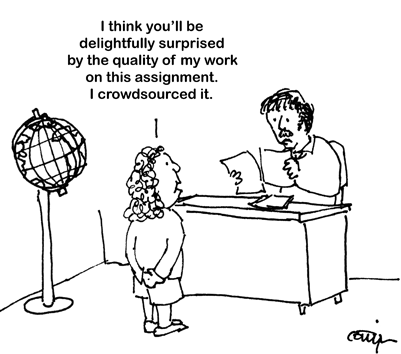Can crowd-sourced solution campaigns save the world? Yikes, I need a better name for the concept, but here’s what it means: an original body that sets up the framework and partnerships to drive a social solution.
The betacup and WeCanEndThis.com are two campaigns I’ve been following. Each brings together corporate, nonprofit, media, technology and design partners to sponsor and facilaite a public, crowd-sourced solution to a social issue. WeCanEndThis.com challenges us to eliminate hunger in America, while the betacup (kicking off April 1) will challenge us to solve the problems brought by disposable cups.
I’m eager to see if either of these systems will produce real change (the betacup contest ends June 1 and WeCanEndThis.com in March 2011). But while I wait, I’m going to speculate on the pros and cons of this hybrid model.
Pros:
- More minds. These are tough, tough challenges. Giving inventors, academics, policy makers, community leaders, social media bigshots, entrepreneurs, number crunchers and the rest a platform to pitch and mold ideas satisfies the numbers game; more minds produce more ideas.
- Specific talents. instructables provides the betacup community a specific platform through which to document ideas and collaborate, while CSRWire is a bullhorn to recruit more problem-solvers.
- Resources. WeCanEndThis.com gets resources (money, expertise, distribution channels, in-kind contribution, clout) from Pepsi and Tyson Foods. Starbucks is the betacups’ sponsorship darling.
- Name recognition. By drawing in organizations that are known and credible, both these campaigns can make do with less time and effort to introduce validate themselves. If they’re solid enough for Starbucks and Pepsi to back them, they have my immediate attention. (I will evaluate later, but the connection is made.)
- Leeway. Because both the betacup and WeCanEndThis.com were created exclusively to facilitate a specific social solution, they don’t have a history to conform to or a bureaucracy to steer.
Cons:
- Lack of ownership. Which partner is strong enough to help create consensus or push harder when it’s needed? Ownership is dispersed, which can make for a stale campaign as partners get fatigued throughout the campaign.
- Temporal knowledge. Who’s the keeper of the campaigns’ products? The winning solution will live on, but what about the learning that came from creating and running a community-based solutions campaign? Who’s responsible for asking for stakeholder feedback–and then utilizing it?
- The wrong crowd. Do these types of social media based platforms speak to the policy makers, scientists and academics who could most benefit from a cross-pollination of ideas? Are the comfortable using these tools and formats? I’m in the dark about this one. Just a hunch, here.
What do you think? Do crowd-sourced solution campaigns have merit? Where am I off-base, too casual or too cavalier? Have you seen similar campaigns produce solutions? Let us know in the comments below or email me, olivia[at]causecapitalism.com.






 I'm Olivia Khalili. I created Cause Capitalism to show you how to grow your business by incorporating a social mission.
I'm Olivia Khalili. I created Cause Capitalism to show you how to grow your business by incorporating a social mission. 

Hi Olivia,
I loved your coverage of this topic, Crowd Sourcing! You are right on with your insights and comments. In fact many of your points are manifested in my site http://www.AltUse.com. I totally get what you are saying.
Keep it coming!
Best regards,
Ben
Not a bad title, Olivia.
A point about “Lack of ownership”. In a community, reputation is a good incentive and social interaction is a good encouragement for people to push things forwards. We are seeing it in many online communities because of that.
Giang: Great point. Thanks for adding it! I absolutely agree but how to you take it from a group of people/lurkers to a community that has a pulse? That’s the magical part that can keep these types of campaigns running. Thanks again for brining up this point.
hello olivia and thank you for thoughtful coverage and some hard questions.
in short, part of the reason we are doing this is to learn. but here are some thoughts on specific issues
ownership – I think this resides with the betacup team and the sponsors. in our experience we get as much as we put in. more feedback to people submitting ideas, more help with their questions, should help the results.
temporal knowledge – the platform we are using (from http://www.jovoto.com) is interesting too us because the ideas and the conversation live on. we’re also tracking discussions and thinking such as yours as it ultimately helps us identify people who can address the very issues you raise.
wrong crowd – this is a tough one. in this particular case we think the winning ideas will span functional areas of expertise. it is not uncommon for challenge solutions to come from unusual places, so this is one way to find these types of people, that said, we are trying to do some targeting by working with existing design and communications communities as well as a group of advisors that span areas we think may be important in finding a good solution.
best
shaun
(betacup team)
Shaun, thanks for taking the time to respond to these questions. I really admire the way that organizations like the betacup are pioneering new ways of solving social problems and look forward to learning more about what works and what needs tweaking.
I encourage any other readers to weigh in. What do you think are the strengths of a crowd-sourced campaign?
Shaun, thanks again and I look forward to following the contest!
Olivia
Olivia:
I’m a little late to the party on this post, but I did want to thank you for highlighting your efforts. We believe that the tremendous shift happening around us means that great ideas won’t come from existing structures. An idea contest allows for someone to add a different perspective to an age old problem.
Scott